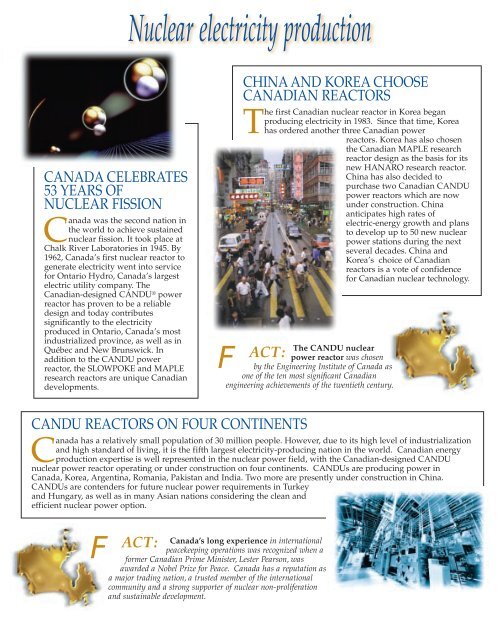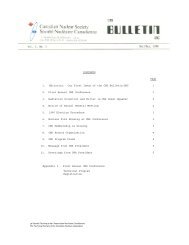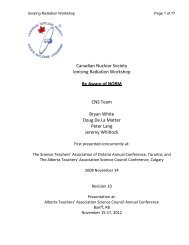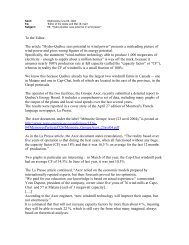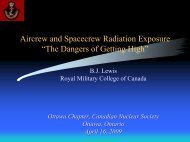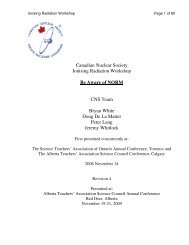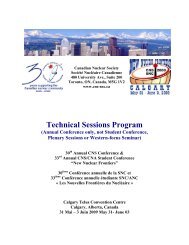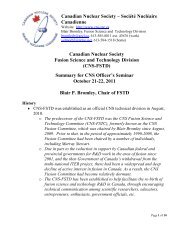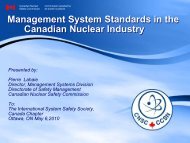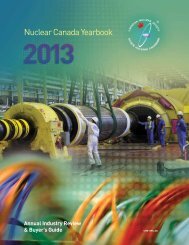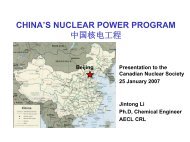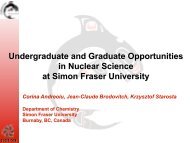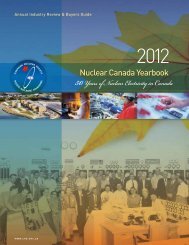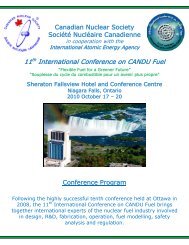Nuclear Advantage - Canada Edition - media.cns-snc.ca
Nuclear Advantage - Canada Edition - media.cns-snc.ca
Nuclear Advantage - Canada Edition - media.cns-snc.ca
You also want an ePaper? Increase the reach of your titles
YUMPU automatically turns print PDFs into web optimized ePapers that Google loves.
CANADA CELEBRATES<br />
53 YEARS OF<br />
NUCLEAR FISSION<br />
<strong>Canada</strong> was the second nation in<br />
the world to achieve sustained<br />
nuclear fission. It took place at<br />
Chalk River Laboratories in 1945. By<br />
1962, <strong>Canada</strong>’s first nuclear reactor to<br />
generate electricity went into service<br />
for Ontario Hydro, <strong>Canada</strong>’s largest<br />
electric utility company. The<br />
Canadian-designed CANDU ® power<br />
reactor has proven to be a reliable<br />
design and today contributes<br />
signifi<strong>ca</strong>ntly to the electricity<br />
produced in Ontario, <strong>Canada</strong>’s most<br />
industrialized province, as well as in<br />
Québec and New Brunswick. In<br />
addition to the CANDU power<br />
reactor, the SLOWPOKE and MAPLE<br />
research reactors are unique Canadian<br />
developments.<br />
CANDU REACTORS ON FOUR CONTINENTS<br />
<strong>Canada</strong> has a relatively small population of 30 million people. However, due to its high level of industrialization<br />
and high standard of living, it is the fifth largest electricity-producing nation in the world. Canadian energy<br />
production expertise is well represented in the nuclear power field, with the Canadian-designed CANDU<br />
nuclear power reactor operating or under construction on four continents. CANDUs are producing power in<br />
<strong>Canada</strong>, Korea, Argentina, Romania, Pakistan and India. Two more are presently under construction in China.<br />
CANDUs are contenders for future nuclear power requirements in Turkey<br />
and Hungary, as well as in many Asian nations considering the clean and<br />
efficient nuclear power option.<br />
ACT: <strong>Canada</strong>’s long experience in international<br />
peacekeeping operations was recognized when a<br />
former Canadian Prime Minister, Lester Pearson, was<br />
awarded a Nobel Prize for Peace. <strong>Canada</strong> has a reputation as<br />
a major trading nation, a trusted member of the international<br />
community and a strong supporter of nuclear non-proliferation<br />
and sustainable development.<br />
F<br />
<strong>Nuclear</strong> electricity production<br />
F<br />
CHINA AND KOREA CHOOSE<br />
CANADIAN REACTORS<br />
The first Canadian nuclear reactor in Korea began<br />
producing electricity in 1983. Since that time, Korea<br />
has ordered another three Canadian power<br />
reactors. Korea has also chosen<br />
the Canadian MAPLE research<br />
reactor design as the basis for its<br />
new HANARO research reactor.<br />
China has also decided to<br />
purchase two Canadian CANDU<br />
power reactors which are now<br />
under construction. China<br />
anticipates high rates of<br />
electric-energy growth and plans<br />
to develop up to 50 new nuclear<br />
power stations during the next<br />
several de<strong>ca</strong>des. China and<br />
Korea’s choice of Canadian<br />
reactors is a vote of confidence<br />
for Canadian nuclear technology.<br />
ACT: The CANDU nuclear<br />
power reactor was chosen<br />
by the Engineering Institute of <strong>Canada</strong> as<br />
one of the ten most signifi<strong>ca</strong>nt Canadian<br />
engineering achievements of the twentieth century.


